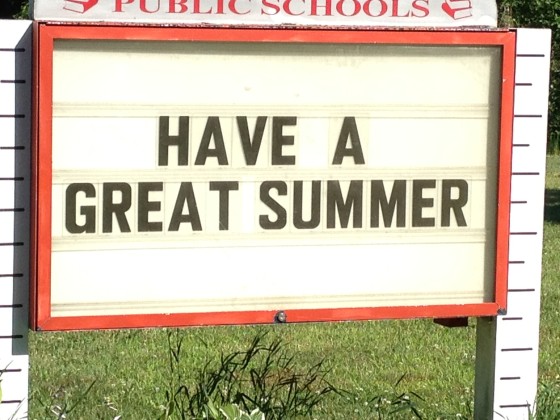
This is a guest post by Julie Singer. Julie is a college sophomore.
This past summer, I was a counselor for a dozen ten-year-old girls at a sleep-away camp in Pennsylvania. It’s the same camp that I have attended for 10 summers before this one (the first eight as a camper, the last two as a waitress). Because the girls in my group were returning to camp for their second or third summer, I knew that that I was going to be working with kids who had begun the kind of love affair with camp that I had experienced over the previous decade. I expected that I would have a wonderful experience, but I didn’t realize how much it would help me to grow as a young adult.
In addition to the group of girls I lived with each night (my bunk), I was a tennis counselor during the day. I taught campers of all ages, combining lessons with fun and games. It was an amazing way for me to get back into tennis after taking nearly two years off because of a knee injury I suffered at the end of my high school tennis career. It was also a great way to get to know campers besides those in my bunk. While I’m no tennis pro, I found myself helping a lot of discouraged tennis players find hope in their skills and in their ability to improve—and that made me want to improve.
For two periods each day, campers decide what they want to do (rather that attending a pre-scheduled activity). Often times, campers who chose tennis were not great at tennis, but were committed to improving—and having fun. It reminded me the importance of never getting discouraged and that if you look for help you can find people to help you reach your goals and be your cheerleader. I also didn’t realize that I had it in myself to be that cheerleader and motivator for these campers. I loved helping them to become better tennis players and to have better attitudes about their game.
During rest periods, clean up time, and every night, I watched the campers in my bunk. Because the living quarters are tight, the girls got into countless little arguments, and they came to me and my co-counselors to ask for help, or to complain. Whether they fought about stickers, someone’s bedding being too close to theirs, or cliquiness, it felt good that they wanted to confide in me.
When a camper was upset about someone else’s actions or words, I found myself often repeating this: “We all face people who are mean to us. It stinks. But is there anything we can do to control their actions? Unfortunately not. What we can do is: (1) Think about the way we want to deal with the situation in the future to avoid it, and (2) Work on how we can talk to the girl who was mean in a more effective way, such as explaining what she did and how it impacted us.”
I also would tell my campers that it’s important to be positive, to be themselves, and to be natural. I counseled them not to force anything if it’s not who they are. “Just be you,” I said countless times. When I noticed the repetition of my advice, I realized I could also do a better job practicing what I was preaching.
One of my camper’s feelings about camp kept changing. One evening, she came to me upset about an incident and told me that she hated camp and didn’t want to come back next summer. At other times, she had told me that she was having a great summer. Finally, during the last week of summer, she said she wished that camp was over and that she could go home.
I told her that I could not help her to go home, that she would have to discuss that with her parents and with the camp directors. I then reminded her that she had had a great summer, and that if she was going to stay that I wasn’t going to let her ruin the last week for herself being upset about one incident with a couple of the girls.
She agreed that she wouldn’t want to look back and be sad that she had a bad last week of camp. I told her that I was always there for her when she needed to talk, or to just take a breather and take a walk with me. I told her that it’s important not to make rash decisions and that she should take things day by day.
I reminded her that she was surrounded by amazing people who care about her and want her to be happy and have great memories from her summer. She stayed until the end and went home happy, planning to return next summer. That was extremely gratifying for me, as was so much of what I experienced and learned this summer.
What are some unexpected learning experiences that you have had? Join the conversation with your comments…
